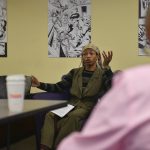After receiving addresses for local college students living off-campus, the City of Boston will send inspection officers to examine off-campus residences in the upcoming weeks for code violations, such as overcrowding.
A 2014 ordinance for the City’s University Accountability Report required schools to include residential addresses of students living off campus in Boston, said Gabrielle Farrell, a spokeswoman for Boston Mayor Martin Walsh’s office.
The Boston City Council voted on Aug. 20, 2014 to require colleges and universities to submit student addresses, The Daily Free Press reported Sept. 4, 2014. Approximately 580 addresses have been identified as places that will be inspected for potential overcrowding, The Boston Globe reported on Jan. 2.
“The addresses shared by the colleges and universities will assist the Inspectional Services Department in determining what properties may be in violation of the Boston zoning code stipulation that no more than four undergraduate students occupy a single unit of housing,” Farrell said in an email. “Any property found to be in violation will be inspected, and appropriate actions will be taken.”
No more than four full-time undergraduate students can live together in a “dwelling unit,” according a 2008 amendment to the Boston Zoning code.
The addresses BU shared with the city kept students’ names and personal information confidential, said BU spokesman Colin Riley. Sharing such confidential information would violate the federal Family Educational Rights and Privacy Act.
“No names were included with addresses, in some cases the addresses being an apartment building with multiple units,” Riley said. “It doesn’t mean any are out of compliance there. It just means that the address has more than four undergraduates living at it.”
Sara Miranda, a sophomore in the College of Arts and Sciences, lives in an off-campus apartment in Allston, and said the information revealed in the inspections will hopefully keep students safe.
“I don’t know the real reasons why they have to submit it, but I would guess that it’s because all of the off-campus fires that have happened and all of the BU students who have been involved in those,” she said. “I don’t mind personally if my name was released, even though I don’t think they are releasing names.”
In 2013, Binland Lee, a senior in CAS, died in a fire at her residence at 87 Linden St., the FreeP reported April 28, 2013. The property landlord and real estate agency received a lawsuit for allegedly renting an apartment that did not have permission from the City to add more bedrooms, violating the number of undergraduates allowed in one unit, the FreeP reported on Sept. 4, 2014.
A 2014 Boston Globe Spotlight Team series, titled “Shadow Campus,” highlighted the safety hazards and illegal housing conditions that lead to Lee’s death.
“Even just last semester, there was a huge fire in Allston, and I remember my friend’s apartment was right next door, and so she was evacuated and was really nervous that her building was going to catch on fire too,” Miranda said. “It’s definitely something to think about.”
While the City will not have access to students’ names, Tara DeRosa, a junior in the School of Management, said she still thinks the inspections disrupt their privacy and the purpose of the off-campus experience.
“I personally don’t really see that being necessary. For me, it’s definitely a breach of privacy. It’s a little odd, since we’re not on campus,” DeRosa said. “I moved off campus just to have more of a real-life situation … part of that is being responsible for yourself and making sure your own apartment is safe and everything. I don’t think there should be random inspections.”
Dean of Students Kenneth Elmore met with students Jan. 21 to give them information about the city’s enforcement efforts.
Katherine Hasenauer Cornetta, assistant to the Dean of Students, said although the office does not have control of students’ housing affairs off campus, it will continue to offer assistance and information to students about the upcoming inspections.
“A lot of these types of inspections tend to come around move-in weekends. We usually aren’t notified for every single [code violation], but we’ll find out if a house has been inspected and deemed completely uninhabitable,” she said.
In serious situations when students do not have a place to go while their landlords make repairs or a residence has been deemed uninhabitable, Cornetta said the office will make sure students have a place to stay.
“In dire situations, if we have space on campus, we’ll bring them on temporarily. That’s becoming increasingly rare,” she said. “We don’t get to know about every single time a house has been deemed uninhabitable. If that happens to students, they need to contact us, so we can know what’s going on, and we can put a bunch of things into motion to help them out and navigate the process.”
Miranda said beyond the City’s inspections, there are other issues that need to be addressed with off-campus housing.
“It’s a good thing for the city to do, but I think it’s probably not going to be realistic in what they can really do, especially because overcrowding is a huge issue,” she said. “There’s not a ton of affordable housing right near the schools, and everyone wants to be as close to campus as they can.”
Editor-in-Chief. Bostonian by way of Indiana. Excessive Instagrammer. Seltzer addict. Journalism junkie, storytelling fiend.















samii,,you are doing so great.,. you will one day be a great journalist!!keep up the good work i am so proud of you, i love you. aunt Mar.